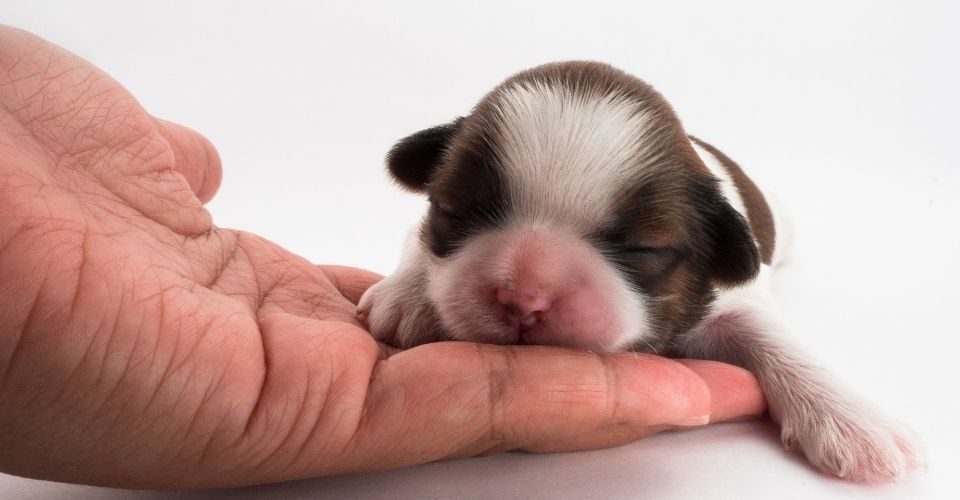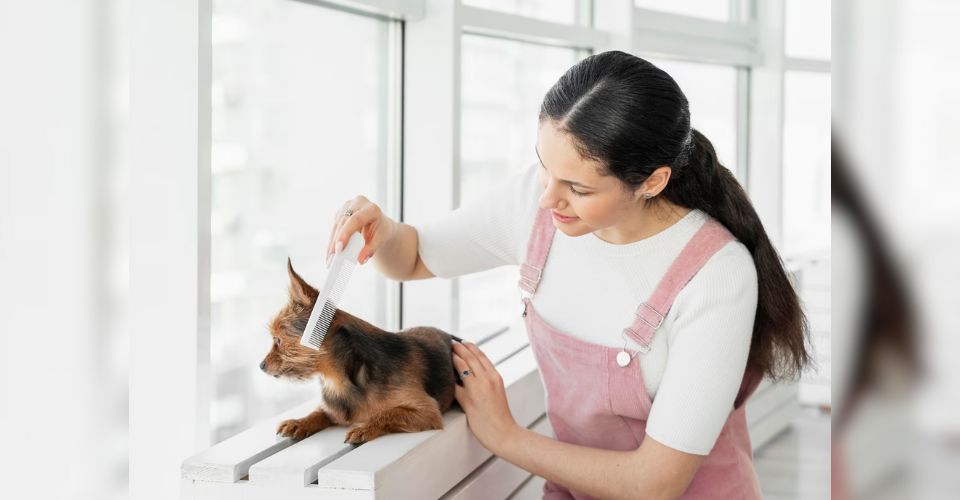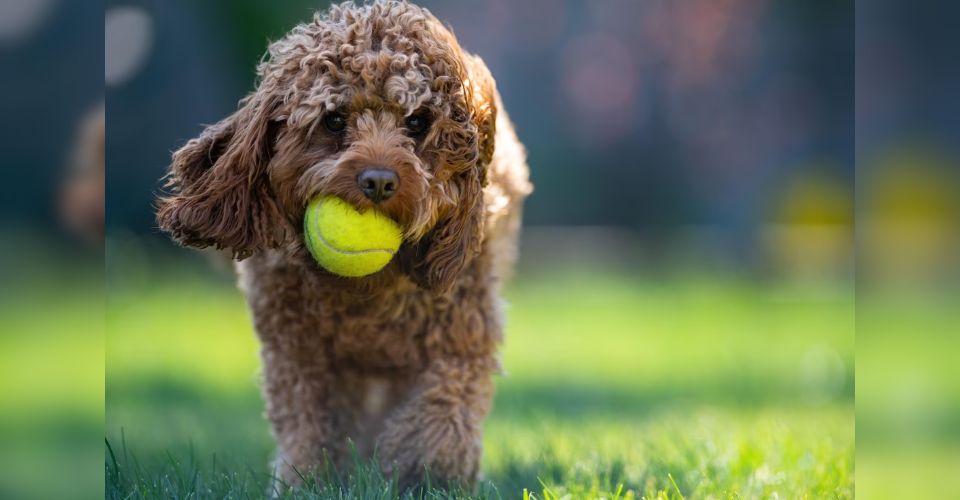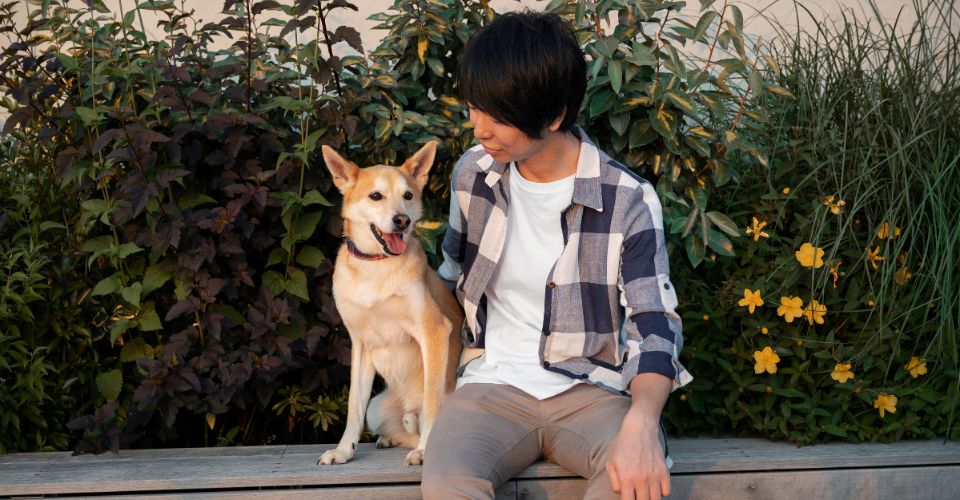A dog baby is not like a boss baby that is born fully developed, not needing any nursing. Rather, these cute little fellas are extremely delicate and are born with eyes closed. Being eager to show them the world, dog owners get curious about when do puppies open their eyes?
The very first thing you need to know is to be patient. Don’t try to open their eyes unless that happens naturally. Otherwise, you can damage your dog’s sight or eyelids. Let nature take its course.
Generally, it takes 10 to 14 days for newborn puppies to open their eyes—some breeds may even take longer. Most puppies will start by opening one eye at a time over the course of a few days. “This time is called the transition period—from week 2 to week 3 of a new puppy’s life” says Zazie Todd, PhD, author of Wag: The Science of Making Your Dog Happy.
But why do puppies open their eyes that late?
Why Do Puppies Open Their Eyes Late?
Every specie of animal is different in terms of how developed its babies are when they are born. A chicken is fully developed when it breaks the shell and comes out; many reptiles are also fully developed at birth; and marsupials take months inside the mother’s pouch.
Interestingly, puppies are somewhere in the middle. They require mother’s care for the first few weeks of life. That’s the reason vets strictly forbid separating puppies from their mama until they are at least 8 weeks old. At the initial stages of life, puppies are blind. It’s because puppies’ eyes aren’t fully developed at birth.
Over the next two weeks, their eyes continue to develop. At this point, they need to be protected from bright light, air particles like dust or dander, and potential scratches from littermates. Later on, even after a puppy’s eyes are fully open, take care not to accidentally expose them to too much strong light before they are ready, else they might lose their eyesight.
The process of opening eyes will come easily and naturally for most puppies—but you still want to keep an eye on certain signs to make sure that everything is going correctly with your puppy. Because, if two-week-old puppies won’t open their eyes, there may be some underlying health concerns.
My Puppy Is Not Opening His Eyes, Is There Something Wrong?

If your puppy is not opening his eyes, look for the following problems:
1. Your Puppy’s Eyelids Don’t Open by Two Weeks of Age
There could be two reasons. First, maybe your puppy belongs to some breeds, such as German Shepherd, Golden Retrievers, Maltese, etc., that take longer—ten days to two weeks—to open their eyelids.
But if the two-week time goes without your puppy opening his eyes, it might be a sign of a developmental or congenital issue.
2. Your Puppy Has Swelling Or Bulging Under The Eyelid
If there is any inflammation or bulging under your puppy’s eyelids, and he can’t open his eyes, it may be a sign of eye infection.
3. Your Puppy Has Pus Or Discharge From The Eye Area
Any pus, redness, yellowish or white discharge, or eye gunk in or around the eyes, is a sign of an infection.
4. There Are Milky Spots On Your Puppy’s Eye
If your puppy has milky spots on his eyes or doesn’t seem to be able to see things by the 3rd or 4th week, it might mean that the puppy is blind or has some kind of eye issues and needs an immediate vet check.
5. Congenital Eye Problems of Puppies
Sometimes puppies are born with congenital eye problems. These can include:
- Missing eyes
- Small eyes
- Choroidal hypoplasia
- Juvenile cataracts
- Detached retinas
When Do Puppies Open Their Eyes and What They Can See?
As mentioned earlier, puppies open their eyes after two weeks, and till then, they spend most of their time sleeping. Usually, you’ll find them snoozing in the cozy laps of their mothers.
Even after two weeks, when puppies open their eyes, their sight is still limited. They will have a blue-grey appearance, and their vision will be cloudy and blurry as compared to an adult dog’s eyes.
Moreover, at the age of 4 weeks, their ability to control how much light gets into their eyes—known as the pupillary light reflex—and withstand the brightness does not fully develop. Puppies younger than 4 weeks of age don’t have the ability to protect their eyes with a blinking reflex, so they are at an increased risk of damage to the surface of their eyes.
Therefore, it is important to keep puppies in fairly dim environments to avoid direct bright light that disturbs them.
A puppy’s vision and ability to see distance continue to develop until 8 weeks of age, and by 16 weeks, a puppy’s eyesight is fully developed for distance.
| Time | Puppy’s Eye Development |
| 8 – 16 days | Puppy’s eyes remain closed |
| 4 weeks | Puppy’s eyes are open, but the vision is blurry and cloudy |
| 8 weeks | Puppy’s vision and ability to see distance continues to develop |
| 16 weeks | Puppy’s eyesight is fully developed for distance |
Interesting Facts About ‘When Do Puppies Open Their Eyes’?
Here is the summary of the above information, along with some new facts relevant to the opening of puppies’ eyes that one should be aware of.
- Even after birth, puppies’ eyes continue to develop, which is why they do not open their eyes right from birth.
- Before puppies are able to open their eyes, the only senses active right from birth are the sense of touch and smell.
- Puppies don’t open their eyes together. First, they would open one eye for a day or two, and later on, they open the second one as well.
- After both eyes are open and the sense of vision is developed, the hearing sensation of puppies starts to develop.
- Also, after puppies open their eyes, the development of teeth starts.
- Certain breeds like Golden Retrievers have a tinge of light blue in their eyes when they are young, which disappears after some time.
- After getting their sense of vision, puppies are able to recognize other puppies and their mothers.
- Upon opening their eyes for the first time, a puppy’s vision is very blurry.
- Bulldog puppies take three weeks to open their eyes.
- Maltese puppies take a little more than two weeks to open their eyes.
- German Shepherds or Golden Retrievers open their eyes for about 10 to 14 days.
- Keep the pups away from bright lights until they have opened their eyes properly. Even after the eyes have opened, it is important to avoid bright light for the first few days.
- It’s easy for puppies to open their eyes when there is no bright light.
- It is important to keep the newborn puppies in a clean environment where there is no dust. Unhealthy surroundings can cause bacterial or fungal infections to newly developed eyes.
- As soon as the eyes are fully opened, a special membrane called a tapetum lucidum forms, allowing dogs to see in the dark.
- If newborn puppies are taking long to open their eyes, they may have developed certain infections of the conjunctiva that can lead to blindness of the puppy if left untreated.
Having said that, if your newborn puppies sleep all the time and you worry about when do puppies open their eyes, then just wait. It’ll happen in two weeks—at most.





